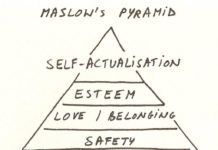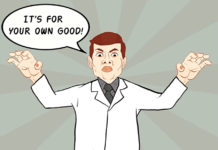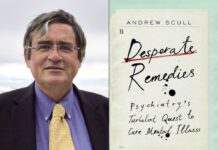The FDA Is Hiding Reports Linking Psych Drugs to Homicides
In my wildest dreams, I could never have imagined being drawn into a story of intrigue involving my own government’s efforts to hide, from the public, reports of psychiatric drugs associated with cases of murder, including homicides committed by youth on the drugs. But that is precisely the intrigue I now find myself enmeshed in.
Overcoming the Stigma of Depression
One of the roadblocks to recovery for those who suffer from depression is our culture's tendency to stigmatize depression and other mental health disorders. After my first hospitalization, I remember the dilemma I faced in trying to explain my three-day absence to my employer. If I told the truth—that I was being treated for anxiety and depression—I stood a good chance of losing my job. Instead, I reported that I had been treated for insomnia at a sleep clinic. In another instance, a client of mine who worked as a nurse was petrified of telling her colleagues that she dealt with depression, but when she shared her diagnosis of cancer, they showered her with with love and support.
Psychologist Debunks Common Misconceptions of Maslow’s Hierarchy
Utilizing Maslow’s published books and essays, psychologist William Compton delineates common myths and attempts to respond to them.
The Real “Mental Illness” Epidemic: Withdrawal from Antidepressants
If the incidence of mental illness has remained the same, but an ever-increasing percentage of the population takes psychiatric medications, then these drugs are being over-prescribed. Now there is an epidemic of people trying to stop SSRI antidepressants, and the effects can be crippling.
Should You Ever Ask Someone “Are You Suicidal?”
For every person “Are you suicidal?” may assist, there are many more of us who are scared into silence when those words are uttered. Why? Well, “Are you suicidal?” is, in fact, the king of the suicide risk assessment questionnaire. “Are you suicidal?” has become the red, neon, flashing sign that screams “Stop! Don’t talk to me!” Perhaps this might just explain why suicide risk assessments are well known not to work.
Robert Whitaker Answers Reader Questions on Mad in America, the Biopsychosocial Model, and Psychiatric...
On the Mad in America podcast this week we have Robert Whitaker with us to answer questions sent in by readers and listeners.
Chris van Tulleken—Ultra-Processed People: Why Do We All Eat Stuff That Isn’t Food and...
We are joined by Dr. Chris van Tulleken who talks about the science, economics, history, and production of ultra-processed food. We discuss some of the effects of UPF on our brains and bodies and how the food industry positions UPF to dominate our diets.
No More Tears? The Shame of Johnson & Johnson
In 1972, prisoners at Holmesburg Prison in Philadelphia were paid $3 to have their eyes held open with clamps and hooks while Johnson & Johnson's baby shampoo was dropped into them. In 2011, mothers of newborns were arrested when their babies tested positive for exposure to cannabis, a false result caused by the use of Johnson & Johnson’s Head-to-Toe Foaming Baby Wash. Young men have undergone mastectomies to remove breasts grown as a result of Johnson & Johnson antipsychotics, which were used as a result of Johnson & Johnson's criminal promotion of its drugs for off-label purposes. And now, Johnson & Johnson has announced the removal of carcinogenic chemicals from their No More Tears baby shampoo.
A New Silver Bullet? The Lurasidone Story
Recently, I have been the target of much wooing by my local Sunovion rep. I think he leaves messages for me almost weekly and he sends me missives - glossy brochures and reprints from major psychiatric journal. What is the subject of this attention? The drug - lurasidone (Latuda).
Andrew Rich: “I Didn’t Know Stuff Like This Existed”
In this second part of MIA’s report on compulsory outpatient treatment orders, Michael Simonson tells of how he came to report on this topic, the results from MIA’s survey of people who have experienced such forced treatment, his interviews with several of the survey respondents, and more on Andrew Rich’s life.
When ‘For Your Own Good’ Actually Means ‘For My Own Good’
“For your own good” is oppressive. Embedded in that four-word phrase is the idea that each of us doesn’t understand who we are or what we need. Someone else is the expert. Someone else has the privilege to hold all the answers, and if those answers don't work for us then somehow it's our fault.
Andrew Scull—Desperate Remedies: Psychiatry’s Turbulent Quest to Cure Mental Illness
Sociologist and author Andrew Scull discusses the history of psychiatry's "Desperate Remedies," from lobotomy and the asylum to the failures of today's drugs and the fads of ketamine and deep brain stimulation.
Psychiatry’s Failure Crisis: Are You Moderately or Radically Enlightened?
The moderately enlightened acknowledge some of psychiatry’s failures but, in common with the unenlightened, desperately attempt to preserve the institution of psychiatry.
Jill Nickens – The Akathisia Alliance for Education and Research
This week on the Mad in America podcast we turn our attention to prescription-drug-induced akathisia and joining me to discuss this is Jill Nickens. Jill is the president and founder of the Akathisia Alliance for Education and Research, a nonprofit organization formed by people who have personal experience of akathisia.
Zel Dolinsky: I Have a Right to “Death With Dignity”
Researcher Zel Dolinsky once taught at medical school and worked as a medical writer in the pharmaceutical industry. In his last emails, he told of how the adverse effects of psychiatric drugs led him to choose to end his life.
Recovery Porn: Tell Me Your Story, I’ll Tell You Your Value
There is little denying the power of story… until our own stories get taken from us, positioned against us, and used to determine our value as some sort of human commodity. We deserve to have our stories heard and to hear the stories of others, but on our own terms, without being fetishized or controlled, and without competition for paltry awards and recognition.
Forced Psychiatry is Torture
I am a survivor of forced psychiatry, and I bring this perspective with me as a human rights lawyer. People with disabilities have a right to be as we are and not to have our bodies and minds made over to suit other people. We alone have the right to decide whether a medical treatment will support who we are or detract from who we are, and that is why free and informed consent is the essential requirement.
Fighting for the Meaning of Madness: An Interview with Dr. John Read
Akansha Vaswani interviews Dr. John Read about the influences on his work and his research on madness, psychosis, and the mental health industry.
David Healy – Polluting Our Internal Environments: The Perils of Polypharmacy
On the MIA Podcast, Dr David Healy discusses World Tapering Day, antidepressant treatment and sensory neuropathy and the difficulties that can be encountered when trying to deprescribe.
10 Things I Learned in 5 Years Consulting With People Coming Off Psych Drugs
It's been over 5 years since I started offering non-medical consultations to people in the process of coming off or hoping to come off psych drugs. I wanted to share here some things I have learned in this process. Despite how far we have come, we have a long way to go in the quest to liberate all who wish to be liberated from psychiatry.
The Chemical Imbalance Theory of Depression: Where Is It Going?
The spurious chemical imbalance theory of depression is arguably the most destructive thing that psychiatry has ever done. Worldwide, millions of individuals are taking antidepressants, often with a cocktail of other drugs, because they have been told the blatant falsehood that they need the pills to combat a brain illness.
On Religious and Psychiatric Atheism: The Success of Epicurus, the Failure of Thomas Szasz
When the American psychiatrist Thomas Szasz killed himself a year and a half ago at the age of 92, I thought there would be a global outpouring in psychiatric circles of sympathy or scorn. Instead, his death was largely met with silence, a silence as deafening as the one that attended the second half of his long, prolific, and polemical career. Szasz’ name didn’t show up at all in the APA program last year, and this presentation of mine is apparently the only one to mention him this year. This silent treatment has, ironically enough, and surely against his will, forced him to fulfill the ancient Epicurean ambition to live and die unnoticed.
Remembering Jennifer Kinzie (1979-2021)
Jennifer Kinzie was a licensed mental health counselor who used her lived experience to guide her work—not only as a counselor and therapist, but also as a volunteer with psychiatric survivor groups.
Is Electroconvulsive Therapy (ECT) Effective?
ECT, or shock treatment as it's sometimes called, is a controversial topic. Adherents describe it as safe and effective; opponents condemn its use as damaging and ineffective. But it is still widely used in the US and in other countries. After shock treatment, some clients do appear to be less depressed, but this phenomenon has been interpreted differently by ECT's proponents and opponents. Proponents claim that the ECT treatments have clearly alleviated the depression. Opponents claim that the apparent improvement is an example of post-concussion euphoria, and that the effects are short-lived. My purpose in this article is to examine the evidence that ECT "is highly effective."
Everyone’s Afraid of an Angry Woman: Honoring Sinéad O’Connor
In her tragic passing, I choose to honor her by raising up these words she said, by hearing and believing them.



























